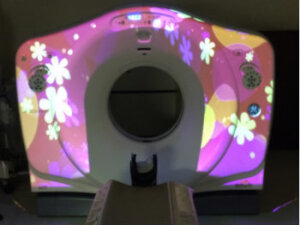Projecting images on the ceiling helps keep kids calm when faced with scary imaging machines during scanning at the Carle Foundation Hospital in Urbana, Illinois.
Being in control of the imagery helps them stay in control of their emotions, as they choose from roughly a dozen different scenes, some even animated, to project during their CT scan.
“It transforms a cold, stark area hospital environment into one that supports parents and children receiving tests and treatment,” said Kelly Oppe, director of Radiology at Carle. “The hospital can be scary and the machine is intimidating. These images help distract and calm kids, and even some adults,” she added in a report on the Carle website.



Ad Statistics
Times Displayed: 16169
Times Visited: 33 Final days to save an extra 10% on Imaging, Ultrasound, and Biomed parts web prices.* Unlimited use now through September 30 with code AANIV10 (*certain restrictions apply)
While a scan may only take a few minutes, said Travis Taylor, Carle's imaging manager, it can be tough to get a frightened, hurt and squirmy child to stay completely still while the imaging takes place.
"Sometimes, it's getting the child in, and getting them coaxed through it," he said,
telling the News-Gazette that the projections help take a child's attention off of the machine and its weird sounds, "so it's clear it's not a monster that's going to eat you."
So far, the response from families has been quite favorable, Taylor told the paper.
Picking the scenes lets the kids feel more in control, too, which helps reduce stress.
"This really empowers kids to make some decisions when they're in a painful situation," Carle spokeswoman Jamie Mullin told the Gazette.
Oppe's team worked with Carle Center for Philanthropy to buy the projector for the Emergency Department CT scanner.
“There is a host of benefits, but decreasing the need for sedation and cost savings were the main motivations,” Oppe said.
Other approaches to patient anxiety include a 2017 report on the use of virtual reality prior to radiation therapy.
Researchers at Thomas Jefferson University
conducted a pilot study to determine if a virtual environment education program could reduce patient anxiety.
"So many aspects of cancer care can produce anxiety for our patients, which can negatively impact their health and well-being," Matthew Marquess, co-first author and program director of radiation therapy at Jefferson College of Health Professions, said in a statement.
The research team provided personalized education for each patient using the Virtual Environment Radiotherapy software developed by the company Vertual. It uses 3D views and life-sized visualizations of structures, dose, CT and beams of the DICOM radiotherapy plans.
After the education session, the patients were significantly less anxious and had a much better understanding of the procedure. The patients and their families used words like confidence, relief and satisfaction to describe how they felt.
"Our pilot study showed that by using a simulated environment to teach our patients about their upcoming radiation therapy treatments, we can significantly increase their understanding of the treatment and reduce their anxiety,” said Marquess.
The projector technology at the hospital was purchased with help from the Carle Center for Philanthropy from Dream, Think, Imagine, a company that specializes in creating unique theme environments used in healthcare settings.

